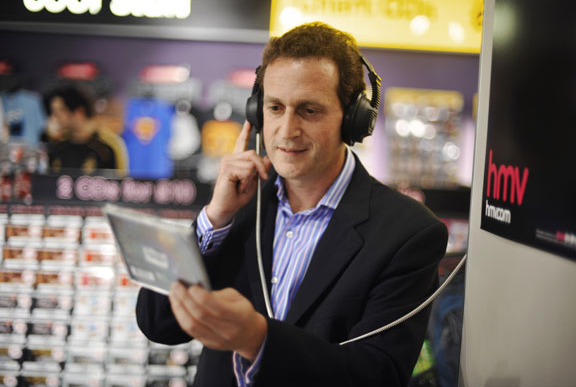Marketing-Interactive recently posted a video interview with Ivy Wong, CEO of HMV ideal and Kelvin Wu, owner of the HMV brand in Asia, to talk about the overhaul of the retail group. The storied history of HMV is something many of us outside of China have been a part of – if not within a business context, then almost certainly as customers. Whilst the desire to revitalise the brand in Hong Kong is laudable, we can’t help but wonder if the brand’s future is still as uncertain as ever.
Let’s start at the beginning. HMV opened shop in London back in 1921, when records (beginning with shellac and later, vinyl) had successfully disrupted the publishing industry, overthrowing the dominance of print music (sound familiar?). Fast-forward to the late 90s and HMV is thriving on CD sales. However we also know that from the late 90s to early 2000s Amazon, Play.com and various others began establishing online direct retail businesses (some including Play.com utilised a Low Value Consignment Relief tax loophole which allowed goods under £15 that were sold from outside the EU to be VAT exempt, a saving that was passed on in a friendly way to consumers in the form of free delivery and such). What did HMV do? Nothing. Well, they got a website up eventually.
We’ll bullet point the rest of the story:
- May 2011 HMV reported debts of £170m, and responded by selling off its Waterstones book chain.
- June 2011 HMV restructured terms with lenders who spared the company from bankruptcy. HMV Canada was sold to Hilco.
- Sep 2011 A new effort spearheaded by Simon Fox to focus on high-value tech instead of costly CDs and DVDs (in terms of floor space) began, even though there was no way in hell the business could ever compete with the likes of Amazon or even Ebay.
- Jan 2012 HMV reported a 16% slump in sales over Christmas, the major gifting season. If we remember correctly it snowed a lot that winter.
- August 2012 – HMV reported a £38.6m loss, Simon Fox walked. HMV was also forced to divest its portfolio of 13 live event venues that included the Hammersmith Apollo. Originally it was a diversification many thought would prop the business.
- Jan 2013 – HMV called in the administrators
- April 2013 – Hilco (which had already purchased HMV Canada) acquired the 132 remaining UK stores, rescuing the chain.
- In May of this year the flagship HMV store at 150 Oxford Street (the world’s biggest music store at the time) was replaced with a Sports Direct (a discount sporting goods chain generally known for selling £3 footballs and spearheading council estate chic).

One HMV fan was quoted as tweeting “that’s a bit sad isn’t it?” Typical British form.
HMV has since opened a smaller store on 363 Oxford Street where the very first HMV store was opened in 1921, giving the tale a nice circle-of-life-esque conclusion.
Turning to Asia, HMV may be a separate legal entity, but its business model is pretty much under the same pressures. In 2013 Hong Kong PE firm AID Partners (good name) acquired the six Hong Kong stores and an additional two in Singapore. Fast-forward to 2014 and we hear what Kelvin Wu (the principal partner of AID Partners) has in store for the brand, which in his eyes (and arguably the eyes of Hilco) is the centrepiece and only justification for sustaining the business.
HMV HK: Key Points
Ivy Wong, CEO of HMV ideal and Kelvin Wu, owner of the HMV brand in Asia:
Create an ideal place in HK for people to share and have fun. Escape the stressful centre.
Radar:
Good call, maybe recalling the Virgin Records and Tapes days when Branson would offer up bean bags and free vegetarian food to guests (last part was a Wiki tidbit, non-verifiable).
Interviewees:
Kevin thinks they need to do more on the online side.
Radar:
They’ve obviously been paying attention. Lucky Kevin has all those Silicon Valley contacts.
Interviewees:
Ivy comments that amidst the apparent downsizing of the music industry, some people ask why Kevin is so brave, spending so much money doing it [revitalising the brand].
Radar:
His glasses match the brand colours; he’s obviously a super-fan.
Interviewees:
Ivy believes they aim to build a brand that can enable the sharing of music, entertainment, passion and love to fans.
Kevin adds they want to make it a cooler brand, more modern, futuristic, to ‘let people know what’s the right attitude to enjoy entertainment and what is the best quality entertainment’.
Radar:
Ivy used the L word, that’s bound to make the suits squirm. But the overall ethos is in line with what a record store should be about. Dictating what people should like…perhaps a semantic slip.
Interviewees:
Following a common industry rhetoric Kevin believes that while downloads are handy and convenient, ‘when you want real texture to entertainment, you have to touch it, enjoy it with your friends, your community’.
Radar:
The reality of the situation is that this kind of sharing appeals to a niche – mainly us musos. It may be sustainable for 6 stores in Hong Kong but it wasn’t for the sprawling network of stores that once (and partially still) existed in the UK. Sharing has changed. Look at the gaming industry – PS4’s new ‘Share Play’ function allows you to play with friends even if they don’t own the game! It’s like a virtual couch, it’s first of its kind, and its what the audience wants.
Interviewees:
Ivy begins sharing some details about in-store ads, and the potential for brand presence. Branded advertising along with experiential marketing are key on the agenda (gigs, press conferences, movie screenings).
Radar:
Compare with the initial statement about escaping the city. Turning HMV into a media-saturated silo only intensifies the stress. Again, we’re faced with a situation where brands are financing the things that were once sustained by consumer spend alone.
Interviewees:
Kevin references his meetings in Silicon Valley – he may open stores to Silicon Valley, enabling exhibitions / demonstrations of cool tech products. One 3D reality enterprise (which is almost certainly Oculus) is interested. The model? An ‘Apple store for other tech brands’.
Radar:
So in one corner you’ve got beardy sat cross-legged on the floor with a Todd Terje deluxe, and in the other some kid’s dancing the hula to a bookshelf.
Go niche or go home (unless you’re Amazon). This is especially so if you plan on building a community around something. You don’t call people who use Amazon ‘Amazoners’ or Taobao shoppers ‘Taobaoers’, they’re just people engaging in a daily practice. HMV isn’t ordinary, it isn’t a utility, and it doesn’t have mass appeal.
That’s the lesson that should have been learnt by now. Instead of turning HMV into a technophiles fun house, why can’t they just keep it bare bones and simple? Ultra deluxe / rare releases, auctions and the occasional guest appearance on one side. On the other side, what about something wacky like a subscription model? People spend 400RMB (roughly $40) per month on gym memberships in China. Create a deep physical-only archive and charge for access. Create silent spaces with amazing sound systems so people can pump their drums. Provide services that allow people to convert their own collections from digital to physical formats and vice versa.
We can think of so many things that would be better than barraging customers with branded advertorial content and dubious tech.


